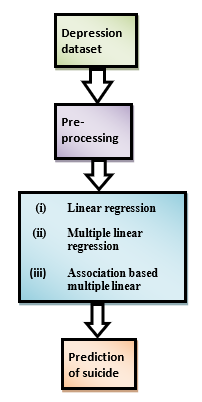Mental Depression Deduction Using Modified Regression Model to Prevent Suicidal Attempt
Main Article Content
Abstract
This study explores a novel approach for predicting depression using association-based multilevel linear regression. The suggested approach, known as association-based multilevel linear regression, uses data on mental depression to predict the prevalence of depression. Several statistical techniques can be used to forecast depression. Several statistical methods, including Linear Regression (LR), Multilevel Linear Regression (MLR), Naïve Bayes algorithm and Decision Tree (DT) were used in this investigation. Because these algorithms are able to predict mental depression based on certain characteristics such as precision and efficiency, their performance reduces. The results of these algorithms' predictions vary significantly, especially in terms of accuracy. The mental health data is fed into a developed model that has been trained to make predictions in order to address the aforementioned problem. Depression is the subject of conversation. A great degree of accuracy is shown by the association-based multilevel linear regression technique and the evaluation of prediction of accuracy in relation to other statistical methods. This study used association-based multilevel linear regression technique. When compared to traditional methods, the method exhibits a substantially greater level of accuracy, almost 99%.

